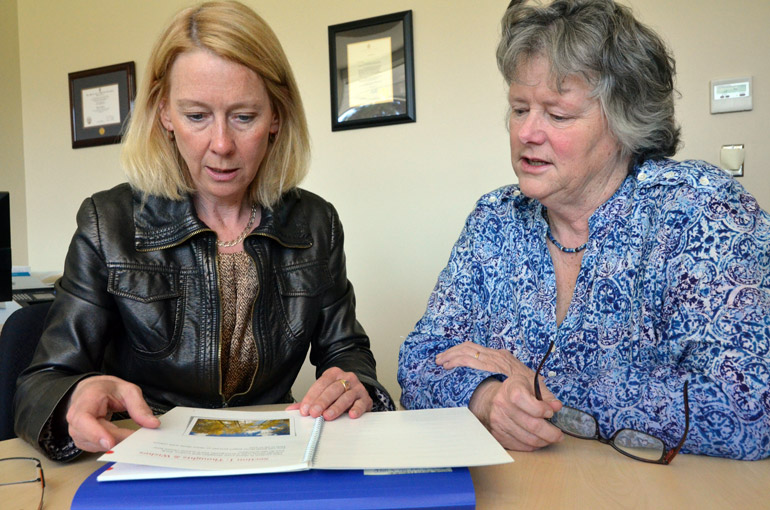
UBC Okanagan Canada Research Chair Barb Pesut and Health Navigator Brenda Hooper look over a workbook created to help train volunteer health navigators to work with chronically ill seniors living in rural communities.
Retired baby boomers may provide volunteer workforce to help in rural settings
Retired baby boomers—professionals looking for something meaningful to do during retirement—might be the answer to helping seniors with chronic illness live independent lives.
A three-year study conducted by researchers at UBC Okanagan has determined that with the help of a trained professional to navigate their health care, chronically ill seniors in rural communities are able to maintain better, healthier lives than those without help.
“Older adults living in rural areas with advanced chronic illness often live with challenging symptoms and limited healthcare services,” says Barbara Pesut, associate professor of nursing at UBC Okanagan. “They have difficulty knowing the services that are available to them and also accessing those services. This results in poor quality of life.”
Pesut, Canada Research Chair in Health, Ethics and Diversity, says support is especially important in rural communities because services are limited, or several hours’ drive away. Each visit to a specialist can be mentally and physically exhausting for the patient and their caregiver.
As part of the research, Brenda Hooper spent the past three years working as a nurse navigator in Castlegar and Trail. In this role, twice a month she visited a chronically ill senior and answered questions about their medical care, resources in their community, and offered advice to families and caregivers.
“Evaluation of the project shows that the use of a nurse navigator has a clear and direct impact on older adults and their families by providing much needed support, education, advocacy, symptom management, and help making complex decisions,” says Pesut. “However, there is also an important potential role to be played by volunteers, trained in navigation, to support these older adults.”
Pesut and Hooper, along with University of Alberta researcher Wendy Duggleby, will now begin a one-year study of the feasibility of using navigation volunteers to support older adults and their families. This study will take place in Trail, Castlegar, and Nelson. Hooper will work with the volunteers to provide navigation services for older adults with advanced chronic illness living in their homes.
“Assisting the frail rural elderly to age in place is essential to quality of life at end of life,” says Pesut. “An innovative way to assist older adults to age in place is to provide navigation services where a knowledgeable individual advocates, facilitates community connections, coordinates access to services and resources, and promotes active engagement of frail older adults with their community.”
And baby boomers may be the answer to finding these volunteers.
“With the retirement of the baby boomers there is this skilled group of people who want to continue to make a contribution to society,” says Pesut. “They have the potential to bring important capacity to the vital role of volunteers.”
Once the year-long pilot project is complete, researchers will have a curriculum and protocol for educating future rural volunteer healthcare navigators and a better understanding of the potential benefits of this role.
People interested in becoming volunteer navigators or who know an older adult who might benefit from navigator services can contact Hooper at brenda.hooper@ubc.ca.
More than $210,000 in grants for this study has been received from the Peter Wall Institute for Advanced Studies, the Vancouver Foundation, and the Technology Evaluation in the Elderly. The project involves UBC Okanagan, Dalhousie University, the University of Alberta, Interior Health, and several hospice organizations.
—30—